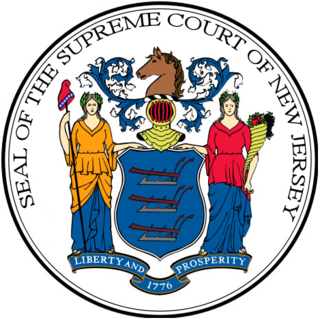Arbitration, in the context of the law of the United States, is a form of alternative dispute resolution. Specifically, arbitration is an alternative to litigation through which the parties to a dispute agree to submit their respective evidence and legal arguments to a neutral third party for resolution. In practice arbitration is generally used as a substitute for litigation, particularly when the judicial process is perceived as too slow, expensive or biased. In some contexts, an arbitrator may be described as an umpire.

The Eleventh Amendment is an amendment to the United States Constitution which was passed by Congress on March 4, 1794, and ratified by the states on February 7, 1795. The Eleventh Amendment restricts the ability of individuals to bring suit against states of which they are not citizens in federal court.
In the United States, an interstate compact is a pact or agreement between two or more states, or between states and any foreign government. The Compact Clause of the United States Constitution provides that "No State shall, without the Consent of Congress,... enter into any Agreement or Compact with another State, or with a foreign Power,..."
Clinton v. City of New York, 524 U.S. 417 (1998), was a landmark decision by the Supreme Court of the United States in which the Court held, 6–3, that the line-item veto, as granted in the Line Item Veto Act of 1996, violated the Presentment Clause of the United States Constitution because it impermissibly gave the President of the United States the power to unilaterally amend or repeal parts of statutes that had been duly passed by the United States Congress. Justice John Paul Stevens wrote for the six-justice majority that the line-item veto gave the President power over legislation unintended by the Constitution, and was therefore an overstep in their duties.
A waiver is the voluntary relinquishment or surrender of some known right or privilege.

The Supreme Court of New Jersey is the highest court in the U.S. state of New Jersey. In its current form, the Supreme Court of New Jersey is the final judicial authority on all cases in the state court system, including cases challenging the validity of state laws under the state constitution. It has the sole authority to prescribe and amend court rules and regulate the practice of law, and it is the arbiter and overseer of the decennial legislative redistricting. One of its former members, William J. Brennan Jr., became an associate justice of the Supreme Court of the United States.

In contract law, a forum selection clause in a contract with a conflict of laws element allows the parties to agree that any disputes relating to that contract will be resolved in a specific forum. They usually operate in conjunction with a choice of law clause which determines the proper law of the relevant contract.

Offer and acceptance are generally recognised as essential requirements for the formation of a contract, and analysis of their operation is a traditional approach in contract law. This classical approach to contract formation has been modified by developments in the law of estoppel, misleading conduct, misrepresentation, unjust enrichment, and power of acceptance.
Commodity Futures Trading Commission v. Schor, 478 U.S. 833 (1986), was a case in which the Supreme Court of the United States held an administrative agency may, in some cases, exert jurisdiction over state-law counterclaims.

Withdrawal from the European Union is the legal and political process whereby an EU member state ceases to be a member of the Union. Article 50 of the Treaty on European Union (TEU) states that "Any Member State may decide to withdraw from the Union in accordance with its own constitutional requirements".
The Waterfront Commission of New York Harbor (WCNYH) is a regulatory agency in the Port of New York and New Jersey along the Hudson River in the northeast of the United States. The bi-state agency was founded in 1953 by a Congressional authorized compact between New York and New Jersey "for the purpose of eliminating various evils on the waterfront in the Port of New York Harbor." Under statutory mandate, the mission of the commission is to investigate, deter, combat and remedy criminal activity and influence in the port district and also ensures fair hiring and employment practices.

The Professional and Amateur Sports Protection Act of 1992, also known as PASPA or the Bradley Act, was a law, judicially-overturned in 2018, that was meant to define the legal status of sports betting throughout the United States. This act effectively outlawed sports betting nationwide, excluding a few states.
The Treaty Clause of the United States Constitution establishes the procedure for ratifying international agreements. It empowers the President as the primary negotiator of agreements between the United States and other countries, and holds that the advice and consent of a two-thirds supermajority of the Senate renders a treaty binding with the force of federal law.

In United States law, the federal government as well as state and tribal governments generally enjoy sovereign immunity, also known as governmental immunity, from lawsuits. Local governments in most jurisdictions enjoy immunity from some forms of suit, particularly in tort. The Foreign Sovereign Immunities Act provides foreign governments, including state-owned companies, with a related form of immunity—state immunity—that shields them from lawsuits except in relation to certain actions relating to commercial activity in the United States. The principle of sovereign immunity in US law was inherited from the English common law legal maxim rex non potest peccare, meaning "the king can do no wrong." In some situations, sovereign immunity may be waived by law.
De Veau v. Braisted, 363 U.S. 144 (1960), is a 5-to-3 ruling by the Supreme Court of the United States that an interstate compact restricting convicted felons from holding union office is not preempted by the National Labor Relations Act or the Labor Management Reporting and Disclosure Act, does not violate the Due Process Clause of the 14th Amendment, and is not an ex post facto law or bill of attainder in violation of Article One, Section 10 of the Constitution.

Gambling in New Jersey includes casino gambling in Atlantic City, the New Jersey Lottery, horse racing, off-track betting, charity gambling, amusement games, and social gambling. New Jersey's gambling laws are among the least restrictive in the United States. In 2013, the state began to allow in-state online gambling. Five years later, the state won a lawsuit that dismantled Nevada's monopoly on legal sports betting.
Walter Francis Timpone is a former Associate Justice of the New Jersey Supreme Court, having been sworn on May 2, 2016. He was nominated to the Supreme Court by Governor Chris Christie and confirmed by the New Jersey Senate in April 2016. He resigned on August 31, 2020.
Lorain Journal Co. v. United States, 342 U.S. 143 (1951), is a decision of the United States Supreme Court that is often cited as an example of a monopolization violation being based on unilateral denial of access to an essential facility although it in fact involved concerted action. When the Lorain Journal monopoly over advertising in the Lorain, Ohio, area was threatened by the establishment of a competing radio station, the newspaper's publisher refused to accept advertising from those who advertised over the radio station and required them to advertise only in the Journal. The purpose of the publisher was to eliminate the competition of the radio station. The Supreme Court held that the publisher had attempted to monopolize trade and commerce in violation of § 2 of the Sherman Antitrust Act and was properly enjoined from continuing its conduct.
Murphy v. National Collegiate Athletic Association, No. 16-476, 584 U.S. ___ (2018), was a United States Supreme Court case involving the Tenth Amendment to the United States Constitution. The issue was whether the U.S. federal government has the right to control state lawmaking. The State of New Jersey, represented here by Governor Philip D. Murphy, sought to have the Professional and Amateur Sports Protection Act (PASPA) overturned, allowing state-sponsored sports betting. The case, formerly titled Christie v. National Collegiate Athletic Association until Governor Chris Christie left office, was combined with NJ Thoroughbred Horsemen v. NCAA No. 16-477.
Murphy v. Waterfront Commission of New York Harbor, 378 U.S. 52 (1964), was a United States Supreme Court case concerning the self-incrimination clause in the Fifth Amendment to the United States Constitution. The Court ruled that a state cannot compel a witness to provide testimony that may be incriminating under other State/Federal laws, even if it granted immunity under its own laws. Decided on the same day as Malloy v. Hogan (1964), the Supreme Court reconsidered its previous rulings that the Federal Government could compel witness testimony that could be incriminating under a state's laws, and states could similarly compel testimony that would be incriminating under Federal law.








